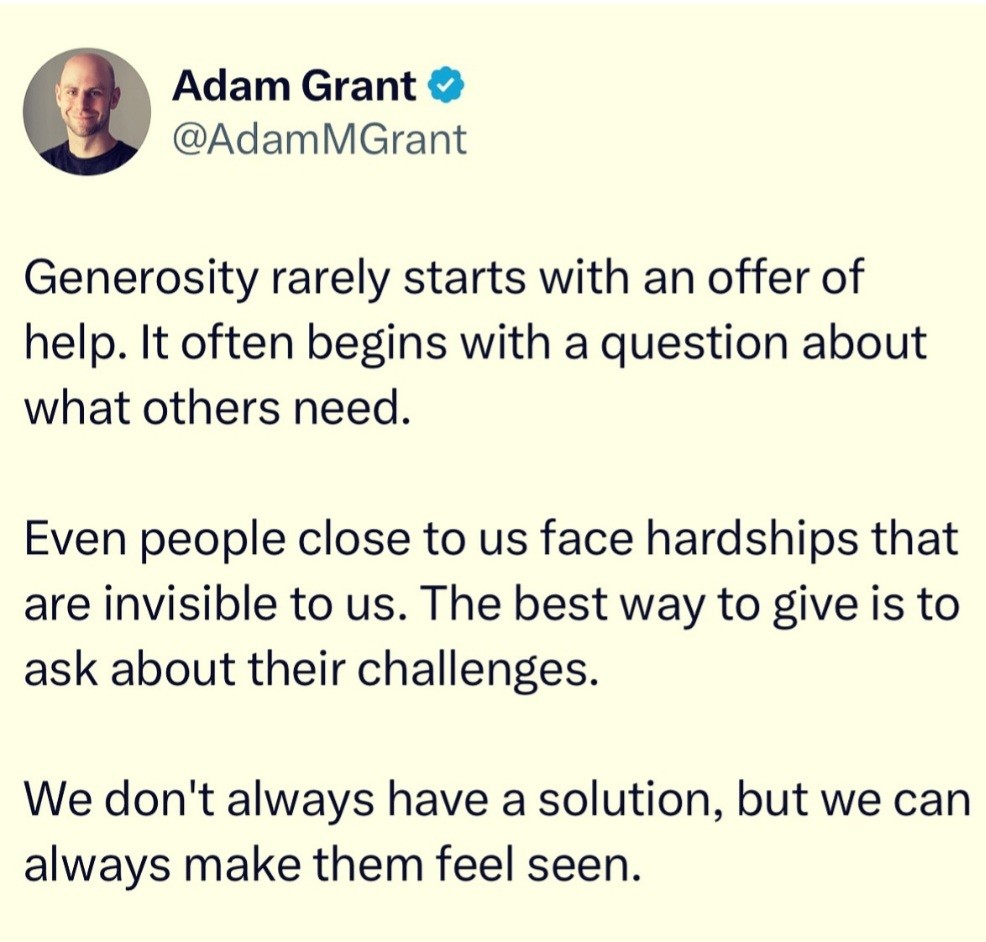Ways you can show up better to a newly bereaved direct report or colleague at work
The second holiday season without my mother has arrived, and although I miss her every day, this time of year is especially hard. It’s a challenging time for anyone who has lost a loved one.

Loss is something that we all will face or have already faced in our lifetime, and yet we are still so uncomfortable with grief. Whether it’s sharing space or offering support, people struggle with how to deal with those who are bereaved.
Many of us bereaved people express our frustrations with how family and friends show up in our grief, but our work leaders and co-workers aren’t exempt from getting it wrong either. I mean, we spend eight or more hours at work and no matter their title or level, people at work can add to the difficulty of navigating this new reality of loss and grief.
I’ve talked to other people who have lost a parent about how their loss impacted how they showed up at work, and everyone shared similar sentiments about the challenges of grief in the workplace.
The way you showed up before the loss is not the same as after the loss and it’s a hard climb to get back to your former self when it comes to the enthusiasm for the work you do. I’ve heard stories of people putting in their two weeks’ notice after a manager tried to rush them through the sadness of their loss. Some people have shared with me that they decided to extend their bereavement, while others checked out at work, a few flat out left their jobs to do some soul searching, and some left in pursuit of their passion because their loss made it very clear that life is just too short.
My thoughts about my career have changed so much that it’s one of the reasons why I’ve been quiet when it comes to sharing career content. I’m working through things that I still don’t quite understand and relearning who I am now that my mom is not here. I can also imagine that the people around me are also trying to get to know the new me, and my family and friends aren’t the only ones who need to know where I am on this journey. Although there are things that only I alone can work through, mentors, managers, and colleagues can be helpful when it comes to career growth and navigating day-to-day at work while on this grief journey.
Here are some ways you can show up better as a leader or a colleague to a recently bereaved teammate based on my first year of loss:
Acknowledge loss, don’t ignore it
When your teammate or direct report returns from their bereavement leave, make sure to acknowledge the loss. Ignoring what happened indicates that you wish to engage with the person as though their life hasn’t changed. Their world has turned upside down and understanding that allows you to open yourself up to connecting with this person who is figuring it out. Acknowledgment allows for grace. Managers and leaders need to know that bereaved people can’t carry on like before the loss. Let go of the expectations you had of someone before their loss and try a clean slate as they figure out the next steps of their career journey.
Everyone on the team should check in often
I remember describing how my Thanksgiving was last year, my first without my mom, and telling someone that though I was in a room full of family members who loved me, I felt so alone. No one was acknowledging the loss and I was hurting in silence. That’s how it feels at work, too.
Although many people experience grief, it is such an individual experience. It will make you feel lonely and isolated, and that is why people who say they care need to check in.
Bereaved people don’t always know what they need. That’s why it’s important to check in and establish trust because they won’t always tell you or know how to express what they need in terms of support. You don’t have to check in every day or every week, but when the loss is fresh for someone, check in at least once a month to see how they are transitioning back to work and how you can support them. Everyone on the team should do this, not just the manager. Why? Because there might be hard days when you could step in to help with their workload. A colleague offering to help on their own is so much better than a manager or leader making someone provide help.
Just listen
One reason why people don’t like checking in with someone who is bereaved is that they don’t know the right things to say. But we often don’t want anyone to say anything. We just want to be heard. Checking in can just mean listening. Give space for people to vent or share their sadness with you. The rare times someone pinged, called, or texted me during the day to allow me to talk through my grief was such a gift. Sometimes we didn’t chat about grief at all but kept it fun and light and I loved that just the same.
Checking in can go beyond support. Connecting with someone who is newly bereaved also allows you to learn who your teammate is becoming during this life change. The way they work and communicate may change and that allows you to adjust your expectations of them or help them through the changes. As leaders, talking to your employees helps you manage them better.
Offer and advocate for PTO support
Current bereavement policies are a DISGRACE. I only got three days when I lost my mother, while my cousin who works for the government got five days for the same loss and that was her aunt. Why is it that she had more time than I did? I’m still not over this.
By the time I returned from the funeral, I had to rush back to work so that I could keep the little five days of PTO that I had left. I made those five days stretch for the rest of the year, through navigating a lot of firsts without my mom as well as managing her affairs. I was exhausted and my mental health suffered by the end of the year.
Bereavement policies are outdated and not inclusive. They don’t account for financial and cultural situations that may delay or extend a burial. They also don’t factor in the mental health challenges of employees who will have to figure out how to live without someone who was always in their lives until now. These policies also don’t account for the time and effort it takes to handle post-funeral affairs, like setting wills or trusts, closing accounts, and selling assets, which require a lot of calls, talking to lawyers, and even going to court. Not to mention some of us have to do all of that alone. People need time off to handle their loved one’s affairs and tend to their personal mental health.
If your company’s bereavement policy is terrible, offering PTO to someone’s bank would be such a big help. It would mean more to a bereaved person than collecting money for flowers. If that’s not possible, leaders should extend grace and flexibility to their team despite company policies. I have a friend whose entire team allowed her to take off as much time as she needed without dipping into her PTO. She was out for an additional six weeks. Her manager and teammates covered for her and I thought that was such an amazing thing they did for her.
So many managers are by the book and afraid to break the rules. But to me, great leaders lead with humanity first even when company policies don’t align.

Many of you will read this and not realize all of the challenges that your colleague or direct report has had to deal with since their loss. And that may be because you don’t talk to them or maybe you haven’t given the space to just listen. My hope is that we start lifting our heads up from work and start leading with more humanity in the workplace.




